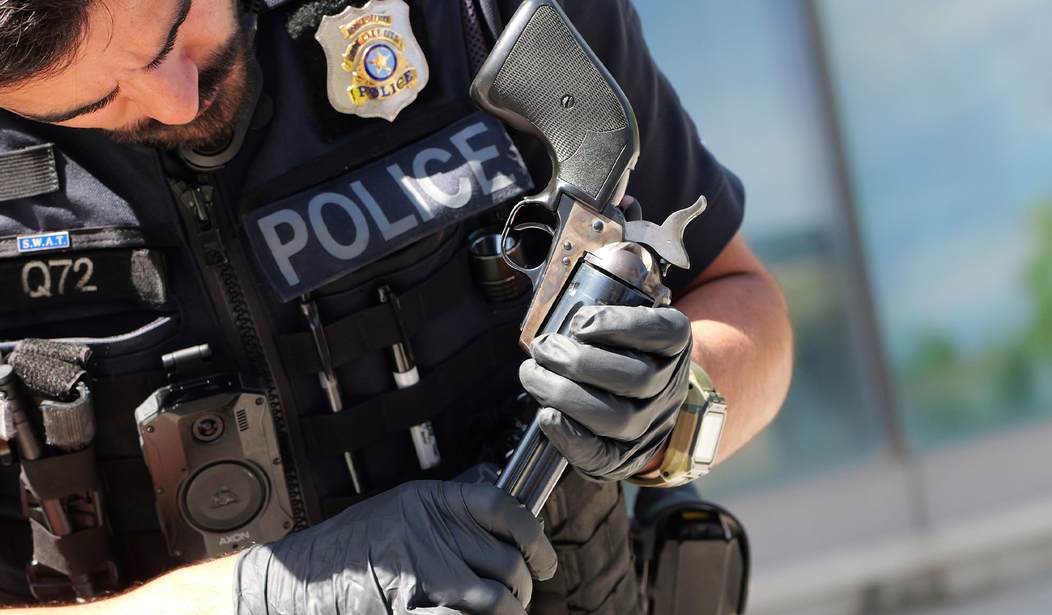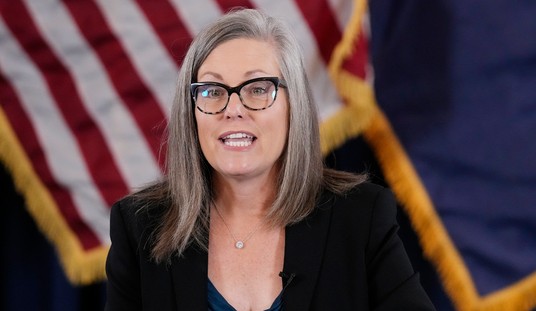San Antonio City Councilman John Courage is a cowardly dog when it comes to the gun "buyback" he spearheaded in the city last fall, claiming that the goal of the compensated confiscation event was never about reducing crime even though he said at the time that it was meant to both "make people feel safer" as well as to end "violent activities."
If it seems odd to you that Courage would boast about the gun turn-in event reducing violence while asserting that it wasn't about reducing violent crime, you're not alone, though that's only one of the reasons why his so-called buyback has emerged as an issue in his run for mayor of the south Texas city. The other problem is that the event ended up costing local taxpayers tens of thousands more than what the councilman promised at the time.
The "buyback" was originally budgeted at $100,000, already a staggeringly high amount of money for something that Courage said would make people feel safer (as opposed to actually making them safer). But as WOAI-TV recently uncovered, the compensated confiscation event ran far over budget, with virtually no evidence that its had any impact on crime, public safety, or even the feelings of San Antonio residents.
Courage touted the event as a success, advertising more than 900 firearms off the streets, but records obtained by the News 4 I-Team revealed not all of the items surrendered were firearms, and the price tag on the event was tens of thousands of dollars more than what the $100,000 figure initially announced.
Of the 906 items collected, 16 were BB or pellet guns, 14 were gun parts, three were toys and at least one firearm was reported stolen.
"There have been young people who have taken toy guns and tried to commit a crime with them and have been hurt themselves or, scared others or things of that nature," Courage reasoned. "So anything that even looks like the gun can be a danger to people in the public."
Seriously? If I showed up with my finger in my jacket pocket to make it look I've got a gun, could I have received a couple of hundred dollars for my trouble, you think?
Violent crime was already declining in the city when Courage hosted his compensated confiscation event last November. According to San Antonio Police Chief William McManus (who was no fan of the councilman's PR stunt), homicides decreased by more than 28 percent last year, well above the roughly 12 percent decrease in homicides across the nation. Assaults declined by nearly 10 percent, while sex offenses dropped by 30 percent. That is what should make San Antonio residents feel safer, not the collection of mostly broken down and beat up firearms along with gun parts and cap guns.
One of those who showed up to Courage's event wasn't there to turn in guns, but rather offer attendees a chance to sell their firearms for what they were actually worth.
The expense and use of resources came as a shock to celebrity YouTuber and congressional candidate, Brandon Herrera. Herrera and other content creators attended the buyback, along with hundreds of other participants seeking to swap their guns for grocery gift cards.
"Whether it was John Courage saying it was just for people to feel better, or it was even the Chief of Police saying that it's a program that doesn't work - a program that doesn't work shouldn't be the the recipient of government funds," Herrera said. "It shouldn't be what the city is paying for."
Herrera joined the expansive line. Attempting to spare other participants the long wait, he offered some cash in exchange for guns before he was asked to leave the Alamodome.
It didn't stop the YouTube sensation from posting a video about it.
"What we were trying to do is use that as an opportunity to make some jokes, make light, but also use that to show the data, and to show some of the quotes directly from the people who put it together, that, 'Hey, this stuff doesn't work,'" Herrera said.
The video netted 4.7 million views.
I guess it all depends on how you define "work". Did it lower San Antonio's crime rate? Nope. Did it reduce accidents involving firearms or gun-related suicides? It doesn't appear to be the case. Studies have shown that these types of compensated confiscation events have no impact whatsoever on public safety, and though Courage claims that those studies are old and out-of-date, he's ignoring a plethora of recent research as well as the opinions of criminologists and law enforcement.
“There is essentially complete scholarly agreement that gun buybacks don’t work,” said David Kennedy, a criminologist at John Jay College of Criminal Justice in New York. “Even in heavily regulated places like New York, there are an awful lot of guns in private hands. Gun buybacks don’t reach and remove a large proportion of guns. Most of those guns in the community before the buyback are there after the buyback.”
A study conducted by the RAND Corp., and released earlier this year seems to agree with Kennedy. It says that not much evidence exists that shows gun buybacks are effective tools for significantly reducing overall gun crime:
The empirical research available on gun buybacks suggests that there has been limited success in targeting high-risk individuals and guns; however, the survey findings described in this section should be interpreted cautiously because gun buyback participants who voluntarily respond to surveys are likely to differ from nonrespondents. In particular, groups at elevated risk of firearm homicide might also be less likely to respond to voluntary surveys.
The report also indicates that the impact does not go far enough for people in Black and Latino communities that are at the highest risk.
Even though many buybacks originate from concerns about firearm homicides, survey findings suggest that few buybacks have drawn large numbers of people from the demographic groups at greatest risk of interpersonal firearm violence.
“It’s also the case that people who organize and participate in these exercises are concerned and want to do something about gun violence,” Kennedy explained. “It makes sense that wanting to get guns out of these hands should be a violence prevention measure, [but] I fear that people think they are doing something effective when they’re not, and that takes away from methods of gun violence prevention that works.”
Kennedy is one of the architects of Operation Ceasefire, which used a targeted deterrence approach aimed at the most violent and prolific offenders in Boston and successfully reduced the juvenile homicide rate by more than 50 percent in the late 1990s. Since then the strategy has been adopted by dozens of cities around the country, and the money that Courage wasted on his "buyback" would have been far more useful if it had been directed at establishing a Ceasefire program in the city instead.
Courage is now running to become San Antonio's next mayor and is vowing to spend even more tax dollars on his pet project going forward, telling WOAI that "the end result is those weapons will not be used to kill anybody or injure anybody or will not be used in a crime, and if that isn't going towards making the public safer, I don't know what else is."
Odds are those guns weren't going to be used to kill or injure anyone or be used in a crime to begin with. The fact that he doesn't understand this doesn't make the public any safer is a huge problem; and one that, with any luck, will keep him and his hands as far away from the city's coffers as possible. Voters should reject his public relations approach to public safety when they head to polls next May, and the other candidates vying for the mayoral position should call him out for wasting taxpayer dollars on such an ineffective and anti-Second Amendment scheme instead of directing those funds towards strategies that are directly aimed at those who are actually committing violent crimes in San Antonio.








